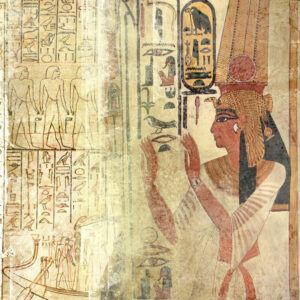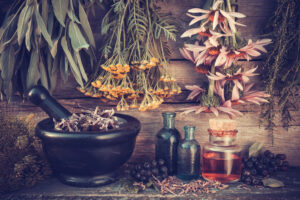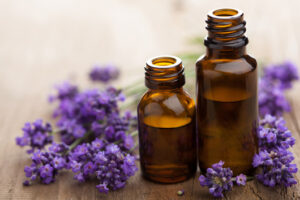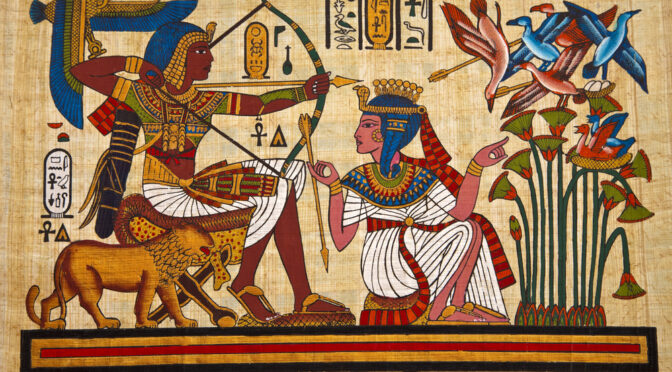Ancient Egypt was a culture renowned for its knowledge and use of cosmetics and ointments. Cleopatra was famed for her beauty as well as her unusual beauty regimes. The ancient Egyptian god of perfume was Nefertum, who was also the god of healing. This inextricable link between aroma and healing spread through many aspects of their culture.
Now, thousands of years later, we continue to use many of the traditions this culture discovered and practiced, essential oils and the use of botanicals as healing agents are widespread. Granted, they’ve been updated a little since then!
The Nile River
Evidence of the earliest uses of essential oils has been found dating back over 5,000 years to ancient Egypt. Egyptian society and culture sprung up around the River Nile because it was a source of life on the continent of Africa.
Not only did the river provided an abundance of plants, which gave opportunities for a rich culture to grow, but the bustling culture that sprung up around it lead to advancements in writing, agriculture, and urbanization.
As a result, developments in herbal medicines, and botanical ingredients in treatments soon followed. More specifically, essential oils started to be developed and used.
The Ebers Papyrus
The biggest indicator of much of these medicinal advancements came in the discovery of a 110 page, 65 feet long papyrus. Known as the Ebers Papyrus, it gave researchers a unique insight into the medicinal practices of ancient Egyptians. The scroll dates back to 1550 BC (although it is thought to be a copy of a much older original) and is the largest record of ancient Egyptian medicine in known existence.
There are over 700 recipes, remedies, and incantations for a variety of ailments that Egyptian citizens suffered. With such an extensive document, it would appear that people practiced these treatments for many years with at least some level of success.
One of the recipes contained in the document suggests cooking herbs and fruit in oil, and anointing it to “remedy the bowels.” A very basic and early use of essential oil.
Cleanliness and Essential Oils
 Ancient Egyptian culture held body-care and cleanliness to such importance that it transcended economic status. Records show that body oil was applied daily by almost all citizens as a form of moisturizing and skin protection. It was also often issued in the form of wages to even the lowest classes of workers. Cleanliness was paramount!
Ancient Egyptian culture held body-care and cleanliness to such importance that it transcended economic status. Records show that body oil was applied daily by almost all citizens as a form of moisturizing and skin protection. It was also often issued in the form of wages to even the lowest classes of workers. Cleanliness was paramount!
Unpleasant smells had associations of impurity, and good smells indicated a sacred presence. It was for this reason that priests were the only authority allowed to use aromatic oils. They were seen as necessary to be at one with the gods, and each deity had its own fragrance dedicated to it. The statues of these gods would have been anointed with these aromatic oils.
Mummification
Perhaps the most famous and pertinent use of essential oils in ancient Egypt is their use in the mummification process. Various aromatic gums such as cedar and myrrh were rubbed onto the bodies to prepare them for mummification and burial, traces of which can still be found on the bodies today.
Additionally, pharaohs have been known to be buried with jars of essential oils. Tutankhamun had jars that were believed to have held lotus flower essence in his tomb. This was a very special scent, with the lotus flower becoming a symbol of ‘Upper Egypt’, growing in abundance along the Nile. Clearly, these oils were incredibly highly revered and played a significant role in ancient Egyptian society.
Oil Extraction
Without the use of modern technologies which extract oils from botanicals with ease, how were these oils obtained?
One such suggestion is that the botanical would have been boiled in water and the resulting oil-rich steam inhaled. For topical use, the main ingredient such as bark would have been ground down incredibly finely and mixed with olive oil.

This would have then been heated and pressed through a wool cloth, and the olive oil and essential oil mixture would have been stored in clay jars for use later on.
A further technique known as ‘enfleurage’ saw animal fats spread out on a flat surface and sprinkled with the plants from which they wanted to extract the oil. Over several days, the fat absorbed the organic compounds of the botanicals.
The plant matter would have been replaced a number of times until the fat had reached the desired concentration. The infused fat could then be applied to the skin as a treatment for a variety of ailments.
Modern Use
The wisdom of essential oils for use in a variety of ways for both physical and mental conditions, have been passed down the generations and spread around the entire world. Essential oil’s use today hasn’t changed too much from its historical use, but modern life certainly provides a greater variety of opportunities for its use.
We are more stressed, we’re breathing in much dirtier air, we’re suffering more from insomnia, and our diets are poorer. Essential oils have never been more pertinent.
Essential oils are absorbed into the body in two primary ways – inhalation, and absorption. They can be added to baths to relieve muscle pain, sprayed on pillows or used in a diffuser to aid peaceful sleep, and have even been found to boost mood and reduce depression.
Beyond the physical benefits, many essential oils are used for spiritual purposes. As previously mentioned, in Egypt, they were used to indicate a sacred presence. Priests used the oils to feel closer to the deities associated with those particular scents. In a similar vein, most essential oils used today have spiritual properties. For example, basil promotes trust and integrity, lavender restores and calms the mind, and lemon brings clarity and awareness.
The physical and spiritual benefits of using essential oils have roots deep in cultural history. Millions of people used and continue to use these oils in remarkably similar ways. Their applications and associations are wide-reaching, so if you haven’t already discovered them, you could be missing out. Anyway, who wouldn’t want to feel like royalty for a day?
Sources:
https://www.youngliving.com/blog/essential-oils-in-the-ancient-world-pt-i/
https://www.youngliving.com/blog/?p=7858
https://healingscents.net/blogs/learn/18685859-history-of-essential-oils
http://areejaromatherapy.com/aromatherapy-in-egypt/

